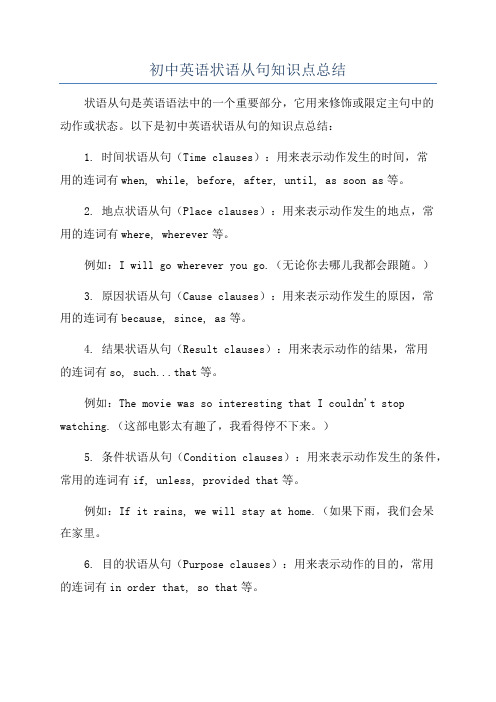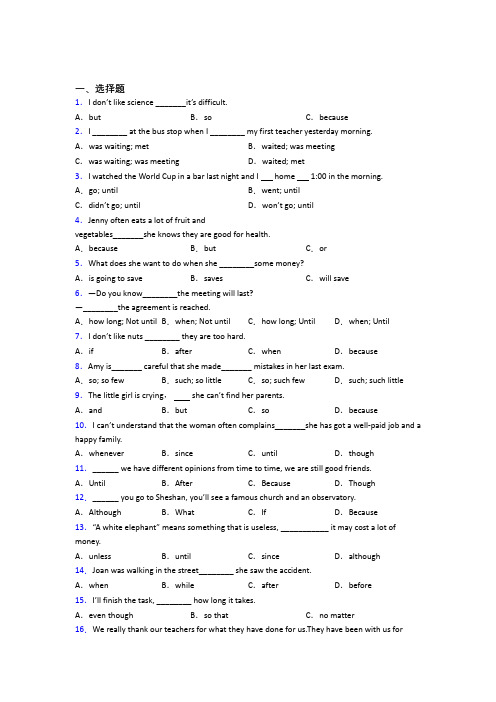新初中英语语法知识—状语从句的分类汇编
状语从句的种类与用法总结

状语从句的种类与用法总结状语从句是在复合句中,作为主句中的一个成分,用来修饰或限制主句的动词、形容词、副词等成分。
状语从句分为时间状语从句、原因状语从句、条件状语从句、目的状语从句、结果状语从句、让步状语从句等几种类型。
下面将对这些状语从句的特点和用法进行总结。
1. 时间状语从句时间状语从句用来表示动作发生的时间,可以分为过去、现在和将来几个方面。
常见的引导词有when, while, as, before, after, since, until 等。
例如:- I will go to bed after I finish my homework.(当我完成作业之后,我会去睡觉。
)- She always looks happy when she sees her friends.(当她见到她的朋友时,她总是看起来很开心。
)2. 原因状语从句原因状语从句用来表示动作的原因,常见的引导词有because, since, as等。
例如:- He didn't attend the meeting because he was sick.(因为他生病了,所以他没有参加会议。
)- Since it is raining outside, we should bring an umbrella.(因为外面在下雨,所以我们应该带把伞。
)3. 条件状语从句条件状语从句用来表示某种条件下会发生的情况,常见的引导词有if, unless, provided that等。
例如:- If it rains tomorrow, we will stay at home.(如果明天下雨,我们会呆在家里。
)- You can go out unless it is too hot.(除非天气太热,你可以出去。
)4. 目的状语从句目的状语从句用来表示主句的动作是为了实现从句中的目的,常见的引导词有so that, in order that等。
状语从句知识点大总结

状语从句知识点大总结一、状语从句的定义状语从句是一个句子,它在句子中作状语,修饰主句中的动词、形容词、副词等,用以表示时间、条件、原因、目的、结果、比较等不同的状态。
状语从句通常由连词引导,常用的连词包括when, while, as, since, before, after, until, if, unless, although, though, as if, as though, so that, in order that, in case, even if等。
二、状语从句的分类1. 时间状语从句时间状语从句表示动作发生的时间,常用的引导词有when, while, as, before, after, since, until, as soon as等。
例如:- When I was young, I used to go swimming every day.- I will call you as soon as I arrive.2. 条件状语从句条件状语从句表示条件,常用的引导词有if, unless, provided that, as long as等。
例如:- If it rains tomorrow, we will stay at home.- I will go out unless it is raining.3. 原因状语从句原因状语从句表示原因,常用的引导词有because, since, as, for等。
例如:- Since it is raining, we can't go out.- I won't go to the party because I don't feel well.4. 目的状语从句目的状语从句表示目的,常用的引导词有so that, in order that, lest等。
例如:- I study hard so that I can get a good job.- We left early in order that we might avoid the traffic.5. 结果状语从句结果状语从句表示结果,常用的引导词有so...that, such...that等。
状语从句的种类及用法详解

状语从句的种类及用法详解状语从句是一个从句,它在句中充当状语的角色。
状语从句通常用于修饰主句的动词、形容词、副词或整个句子。
状语从句可以用来表示时间、原因、条件、目的、方式、结果等不同的内容。
下面将详细介绍状语从句的种类及用法。
一、时间状语从句时间状语从句用来表示一个动作、事件或状态发生的时间。
常见的引导词有when(当...时候)、while(当...的时候)、before(在...之前)、after(在...之后)、since(自从)、as soon as(一...就)、until (直到)、as long as(只要)等。
例如:1. When I arrived at the airport, the flight had already left.(当我到达机场时,航班已经起飞了。
)2. She will not go to bed until she finishes her homework.(她不会睡觉直到她完成作业。
)二、原因状语从句原因状语从句用来表示主句中的动作或状态发生的原因。
常见的引导词有because(因为)、since(因为)、as(因为)、due to(因为)、owing to(因为)、for the reason that(因为)等。
例如:1. She didn't attend the meeting because she was sick.(她没有参加会议,因为她生病了。
)2. Since it is raining heavily outside, we should stay at home.(由于外面下大雨,我们应该呆在家里。
)三、条件状语从句条件状语从句用来表示主句中的动作或状态发生的条件。
常见的引导词有if(如果)、unless(除非)、provided that(倘若)、as long as (只要)、on condition that(在...条件下)等。
【英语知识点】初中英语八大类状语从句语法总结

【英语知识点】初中英语八大类状语从句语法总结状语从句是指句子用作状语时,起副词作用的句子。
状语从句中的从句可以修饰谓语、非谓语动词、定语、状语或整个句子。
状语从句根据其作用可分为时间、地点、原因、条件、目的、结果、让步、方式和比较等从句。
状语从句一般由连词(从属连词)引导,也可以由词组引起。
从句位于句首或句中时通常用逗号与主句隔开,位于句尾时可以不用逗号隔开。
1.时间状语从句(1)When---当……时候,通常指某一特定的时间点,主句与从句的动作同时发生。
(2)When---正在……的时候,突然…。
通常主句是进行时或be about to时,在翻译的时候,when可以译成没想到或突然。
(3)When当从句是进行时,主句是一般时,往往表示不满。
(4)When=after(5)While---在……期间,往往指一段时间。
(6)While---表示一种不满情绪,意思是这边在干某种重要的事,而另一边在享受等。
(7)As---一边……一边,随着(8)The moment---一……就……=as so on as,immediately,2.条件状语从句引导状语从句的连接词有:If如果,unless除非,as long as只要,As(so)far as---据……所知,incase万一,provided that假如,on condition that若是,以…为条件。
3.地点状语从句地点状语从句只有两个连词:Where,wherever。
4.原因状语从句because,as,since,now that,和considering that,seeing that这六个连词都用于表示表示原因,但在语气上一个比一个弱。
5.结果状语从句引导结果状语从句的连词有:that,so that,so…that…6.目的状语从句引导目的状语从句的主要连词有:that,so that,in order that,for fear that,lest.7. 让步状语从句引导让步状语从句的连词有:Although,though,as,even if,even though,no matter,however,whatever,while,whether。
初中英语状语从句知识点总结

初中英语状语从句知识点总结状语从句是英语语法中的一个重要部分,它用来修饰或限定主句中的动作或状态。
以下是初中英语状语从句的知识点总结:1. 时间状语从句(Time clauses):用来表示动作发生的时间,常用的连词有when, while, before, after, until, as soon as等。
2. 地点状语从句(Place clauses):用来表示动作发生的地点,常用的连词有where, wherever等。
例如:I will go wherever you go.(无论你去哪儿我都会跟随。
)3. 原因状语从句(Cause clauses):用来表示动作发生的原因,常用的连词有because, since, as等。
4. 结果状语从句(Result clauses):用来表示动作的结果,常用的连词有so, such...that等。
例如:The movie was so interesting that I couldn't stop watching.(这部电影太有趣了,我看得停不下来。
)5. 条件状语从句(Condition clauses):用来表示动作发生的条件,常用的连词有if, unless, provided that等。
例如:If it rains, we will stay at home.(如果下雨,我们会呆在家里。
6. 目的状语从句(Purpose clauses):用来表示动作的目的,常用的连词有in order that, so that等。
例如:I bought a new notebook so that I can take notes in class.(我买了一个新笔记本,这样我可以在课堂上记笔记。
)7. 方式状语从句(Manner clauses):用来表示动作发生的方式,常用的连词有as, as if, as though等。
例如:He speaks as if he knows everything.(他说话的样子就像他什么都知道。
状语从句知识点总结

状语从句知识点总结一、状语从句的定义状语从句是在复合句中作状语的从句,它用来修饰主句中的动词、形容词或其他副词,表示时间、地点、原因、条件、让步、目的等语义内容。
二、状语从句的类型1. 时间状语从句:表示动作发生的时间。
- 常见引导词:when, while, as, after, before, until, once, as soon as 等。
- 示例:I will call you when I arrive in London.2. 地点状语从句:表示动作发生的地点。
- 常见引导词:where 等。
- 示例:Practise pronunciation where possible.3. 原因状语从句:说明原因或解释。
- 常见引导词:because, since, as, seeing that, now that 等。
- 示例:She can't attend the meeting because she is ill.4. 条件状语从句:表示条件或假设。
- 常见引导词:if, unless, provided that, as long as, on condition that 等。
- 示例:We will go on an outing if it doesn't rain.5. 让步状语从句:对主句内容进行让步或转折。
- 常见引导词:although, though, even though, despite, in spite of 等。
- 示例:Despite the bad weather, we went for a walk.6. 目的状语从句:表示目的。
- 常见引导词:so that, in order that 等。
- 示例:He gets up early so that he can catch the first bus.7. 结果状语从句:表示结果。
最新初中英语语法知识—状语从句的分类汇编

一、选择题1.I don’t like science _______it’s difficult.A.but B.so C.because2.I ________ at the bus stop when I ________ my first teacher yesterday morning.A.was waiting; met B.waited; was meetingC.was waiting; was meeting D.waited; met3.I watched the World Cup in a bar last night and I home 1:00 in the morning.A.go; until B.went; untilC.didn’t go; until D.won’t go; until4.Jenny often eats a lot of fruit andvegetables_______she knows they are good for health.A.because B.but C.or5.What does she want to do when she ________some money?A.is going to save B.saves C.will save6.—Do you know________the meeting will last?—________the agreement is reached.A.how long; Not until B.when; Not until C.how long; Until D.when; Until7.I don’t like nuts ________ they are too hard.A.if B.after C.when D.because8.Amy is_______ careful that she made_______ mistakes in her last exam.A.so; so few B.such; so little C.so; such few D.such; such little 9.The little girl is crying, s he can’t find her parents.A.and B.but C.so D.because10.I can’t understand that the woman often complains_______she has got a well-paid job and a happy family.A.whenever B.since C.until D.though11.______ we have different opinions from time to time, we are still good friends.A.Until B.After C.Because D.Though12.______ you go to Sheshan, you’ll see a famous church and an observatory.A.Although B.What C.If D.Because13.“A white elephant” means something that is useless, ___________ it may cost a lot of money.A.unless B.until C.since D.although 14.Joan was walking in the street________ she saw the accident.A.when B.while C.after D.before15.I’ll finish the task, ________ how long it takes.A.even though B.so that C.no matter16.We really thank our teachers for what they have done for us.They have been with us fornearly three years we came to middle school.A.since B.before C.until17.______________ he is very young, _________________ he can do many things. A.Although;but B.Although;/C./;although D.But;although18.— When shall we start?—Let’s wait ________ the rain stops.A.if B.as C.until D.since19.Mother was cooking in the kitchen________ Jack was watching TV in the room.A.if B.as C.when D.while 20.—Why do you sell old books?—I sell them________ raise some money for the poor students.A.in order that B.in order to C.so that D.because of 21.The policeman asks the child not to cross the street ________ the traffic light turns green. A.when B.until C.because D.after22.My father was watching TV ______ my mother was cooking.A.when B.untilC.while D.as soon as23.—My son hardly even eats vegetables________ it’s good for his health.— Not a good habit.A.and B.but C.so D.although24.___my cousin was practicing the guitar, his elder sister came into the room.A.Since B.While C.Though D.Because25.________decision you make, you must be prepared for the worst.A.Whoever B.Wherever C.Whenever D.Whatever【参考答案】***试卷处理标记,请不要删除一、选择题1.C解析:C【解析】【分析】【详解】句意:我不喜欢科学因为它很难。
初中英语知识点归纳状语从句的构成及用法

初中英语知识点归纳状语从句的构成及用法归纳:状语从句作为复合句的一种,由一个从属连词引导,修饰主句中的动词、形容词或副词,起到说明、程度、时间、条件、原因等作用。
状语从句的类型包括时间状语从句、地点状语从句、条件状语从句、原因状语从句、结果状语从句等。
一、时间状语从句时间状语从句是由when, while, as, before, after, since, until, as soon as 等引导的状语从句。
1. 当时When I arrived at the park, it started to rain.当我到达公园时,天开始下雨。
2. 同时While I was studying, my phone rang.当我在学习时,电话响了。
3. 一时间As he opened the door, a gust of wind rushed in.当他打开门时,一阵风涌了进来。
4. 先后Before I leave, I will finish my homework.在我离开之前,我会完成作业。
5. 之后After she finished dinner, she went for a walk.她吃完晚饭后,去散步了。
6. 自从Since I moved to this city, I have made many new friends.自从我搬到这个城市,我交了很多新朋友。
7. 直到I will wait here until you come back.我会在这里等到你回来。
8. 一……就……As soon as the bell rang, the students rushed out of the classroom.一响铃,学生们就冲出教室。
二、地点状语从句地点状语从句是由where, wherever引导的状语从句。
1. 在……的地方I will meet you where we first met.我会在我们第一次见面的地方见你。
- 1、下载文档前请自行甄别文档内容的完整性,平台不提供额外的编辑、内容补充、找答案等附加服务。
- 2、"仅部分预览"的文档,不可在线预览部分如存在完整性等问题,可反馈申请退款(可完整预览的文档不适用该条件!)。
- 3、如文档侵犯您的权益,请联系客服反馈,我们会尽快为您处理(人工客服工作时间:9:00-18:30)。
一、选择题1.If you _______ someone, you invite them to flight or compete with you in some way. A.encourage B.challenge C.introduce2.— Celia,join us in the Super Summer Camp if it this weekend.—.I'd love to. But nobody knows if it .A.is fine; rains B.is fine; will rain C.will be fine; will rain D.will be fine; rains 3.You will never get anywhere you set a goal. So whatever we do, we should first have a goal.A.unless B.because C.though4.___________ many people may surf the Internet for the latest news, it is impossible that the newspaper will disappear.A.Beacause B.Though C.Since D.Unless5.If it ________ tomorrow, we ________ to have a picnic at the lake.A.doesn’t rain; go B.won’t rain; will goC.doesn’t rain; will go D.won’t rain; go6.The little girl is crying,she can’t find her parents.A.and B.but C.so D.because7.— Would you please ask Tom to come to my office?—Sure, I will tell you about it as soon as he _______back tomorrow.A.will come B.came C.comes D.is coming8.--- What was the party like?--- Wonderful. It’s years ____ I enjoyed myself so much.A.since B.after C.when D.before9.________decision you make, you must be prepared for the worst.A.Whoever B.Wherever C.Whenever D.Whatever 10.—Mum, will our trip be cancelled?—No, we won’t put it off________there is a natural disaster.A.if B.whether C.unless D.when11.I’ll finish the task, ________ how long it takes.A.even though B.so that C.no matter12.The lady was _____ happy _____she couldn't say a word when she heard the good news.()A.too; to B.very; becauseC.so;that13.--We should go to school by bus instead of by car.--Yeah, cars we use, pollution there will be.A.fewer; less B.less; fewerC.the less; the fewer D.the fewer; the less14.Joan was walking in the street________ she saw the accident.A.when B.while C.after D.before15.Sam won’t make any progress ______ he studies harder than before.A.if B.when C.because D.unless16._______you can sleep well, you will lose the ability to concentrate, plan and stay active after one or two nights.A.Once B.Unless C.If D.When17.I’ll go to visit my aunt in England the summer holidays start.A.as soon as B.since C.unless18.It’s not your turn yet. Please wait on the chair until you________.A.have called B.will call C.are calling D.are called19.It was________a difficult task that nobody can finish it on time.A.so B.too C.enough D.such20.—Why do you sell old books?—I sell them________ raise some money for the poor students.A.in order that B.in order to C.so that D.because of 21.—How are you going to spend this weekend?—_________ the weather is fine, we’ll climb Mount Tai.A.As well as B.As good as C.As soon as D.As long as 22.Mr.Green doesn’t have any hobbies________ you call watching TV a hobby.A.though B.unless C.because23.—My son hardly even eats vegetables________ it’s good for his health.— Not a good habit.A.and B.but C.so D.although 24.There are fewer and fewer tigers in India. The situation will continue _______ humans stop hunting them for their fur and bones.A.if B.unless C.because D.since25.Now most families have only one child _____ our country’s one-child policy.A.so B.because C.because for D.because of【参考答案】***试卷处理标记,请不要删除一、选择题1.B解析:B【解析】句意:如果你挑战某人,你会邀请他们去战斗或者和他们在某方面竞争。
A. encourage鼓励;B. challenge挑战;C. introduce介绍。
根据句意:你邀请他们去战斗或者和他们在某方面竞争,可知是“如果你挑战某人”,“挑战”challenge。
分析题干可知这是if引导的条件状语从句,要遵循“主将从现”的原则,所以if从句要用一般现在时,故答案选B。
2.B解析:B【解析】试题分析:句意:——西莉亚,如果这个周末不下雨的话,就来加入我们的超级夏令营吧。
——我非常乐意。
但是没有人知道周末是否会下雨。
第一句中的连词if意为“如果”,用来引导条件状语从句,从句用一般现在时表示将来,故用is fine;第二句中的if意为“是否”,引导宾语从句,根据句意从句用一般将来时will rain。
故选B。
考点:考查条件状语从句的用法和宾语从句的用法。
3.A解析:A【解析】【详解】句意:除非你设定一个目标,否则你永远也到不了任何地方。
所以无论我们做什么,我们首先应该有一个目标。
考查连词。
unless除非;如果不; because因为;though尽管,虽然。
根据“You will never get anywhere”可知下文是unless引导的让步状语从句,此处是“除非你树立目标”,根据题意,故选A。
4.B解析:B【解析】句意:尽管许多人通过网络获取最新消息,但是很可能报纸不会消失。
Because 因为,引导原因状语从句;Though尽管,引导让步状语从句;Since自从,引导时间状语从句;Unless除非,引导条件状语从句。
根据两句话之间的逻辑关系可知应选B。
5.C解析:C【解析】【分析】【详解】句意:如果明天不下雨,我们就去湖边野餐。
考查主从复合句。
根据If it ___ tomorrow, we ___ to have a picnic at the lake.可知此题考查if 引导的条件状状语从句,遵循主将出现的原则,即主句用一般将来时,从句用一般现在时;根据句意:如果明天不下雨,我们就去湖边野餐。
从句用否定形式,rain为实意动词根据it可判断,需要加否定助动词 doesn't,动词用原形 rain,排除B、D选项;主句用一般将来时,即will+动词原形,排除A选项;故答案选C。
6.D解析:D【解析】【分析】【详解】句意:这个小女孩正在哭,因为她找不到她的父母了。
考查连词。
根据句意可知,小女孩哭的原因是找不到父母了,所以后句表示哭的原因。
and 并列连词,并且;but并列连词,但是,表示转折;so连词,因此,表示结果;because连词,因为,表示原因。
根据句意,故选D。
7.C解析:C【解析】【分析】【详解】句意:——你能叫汤姆来我办公室一趟吗?——当然,他明天一回到办公室我就跟他说。
考查时态。
will come将会来;came来过,过去式;comes一般现在时;is coming现在进行时表将来。
